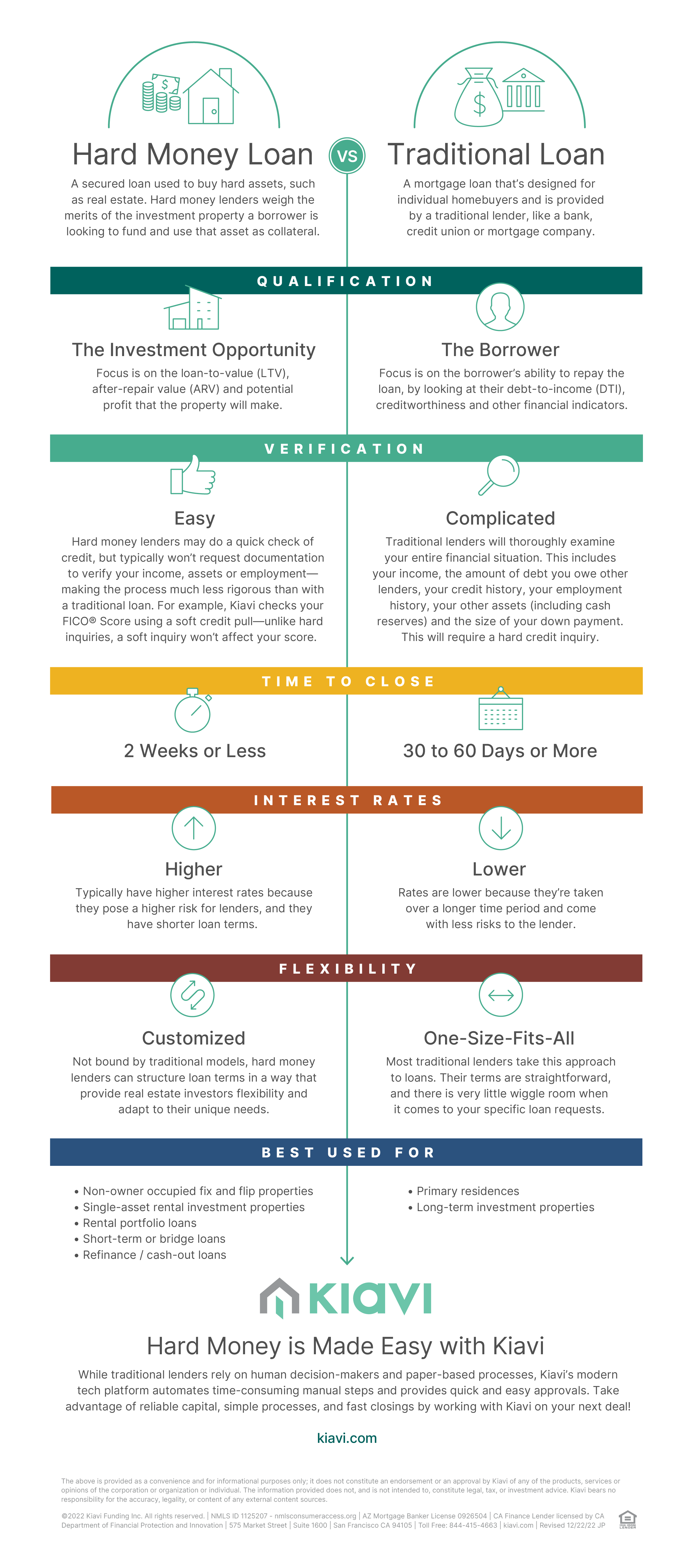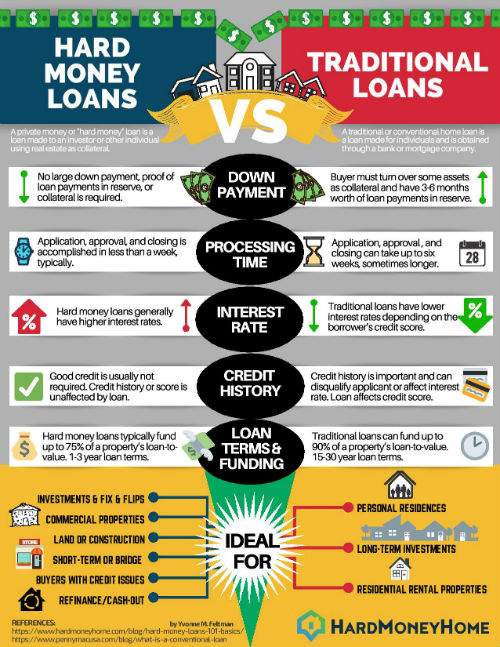Exactly How a Hard Money Financing Works: a Comprehensive Overview for Borrowers
Hard cash fundings present an unique funding option that leverages actual estate as security, appealing especially to those who need quick accessibility to capital. Comprehending the mechanics of these loans is important for borrowers, as the procedure differs substantially from standard lending methods.
Recognizing Tough Cash Loans
Understanding difficult money fundings is crucial for both real estate financiers and debtors seeking quick capital. Hard cash finances are protected by genuine estate, with the building itself serving as collateral.
The terms of tough cash financings are typically temporary, ranging from a couple of months to a few years, and they commonly include greater rates of interest compared to traditional car loans. This costs reflects the greater threat lenders presume and the expedited nature of the lending process. Financiers often make use of difficult money loans for fix-and-flip tasks, enabling them to obtain, remodel, and offer residential properties rapidly commercial.
Furthermore, the underwriting requirements for hard cash financings are normally much less strict, assisting in quicker approvals. Customers have to remain vigilant concerning the repayment terms and prospective penalties for default, as these lendings can lead to considerable economic repercussions if not managed properly. Understanding these characteristics is critical for informed decision-making in property funding.
The Application Refine
Requesting a tough cash car loan entails a streamlined procedure that can be completed relatively promptly contrasted to traditional loaning techniques. The initial step is to identify a trusted tough money lender who specializes in the sort of residential property funding you require. Debtors generally begin by submitting a lending application, which consists of important information regarding the building, the desired usage of the funds, and their monetary standing.
Once sent, the lending institution will perform a property appraisal to identify its market price and assess the risk involved. Unlike conventional finances that greatly weigh credit history, tough cash lenders primarily concentrate on the collateral value. This means that properties with strong equity can secure financing even if the customer's credit rating is much less than outstanding.
After the evaluation, the loan provider will certainly provide a finance proposal, outlining the terms, rate of interest rates, and any additional charges. Upon approval, debtors will need to give necessary paperwork, such as proof of identity and possession of the building. The final step is the closing procedure, where the funds are disbursed, allowing consumers to make use of the resources for their desired function.
Advantages of Hard Money Lendings

Additionally, difficult money fundings are mostly based upon the value of the collateral rather than the consumer's creditworthiness. This can be specifically beneficial for those with less-than-perfect credit report or for investors aiming to leverage homes click here to read with equity. The versatile underwriting criteria permit borrowers to gain access to funds that might or else be not available with standard borrowing channels.
Moreover, difficult money lenders frequently have an even more streamlined approval process, which can be beneficial for real estate capitalists who call for fast accessibility to resources for building acquisitions or improvements. This agility can bring about an one-upmanship in fast-paced markets.
Lastly, hard money loans can supply a useful tool for consumers looking for to fund special tasks that do not fit conventional borrowing criteria, therefore expanding their investment potential.
Possible Threats and Downsides
While tough cash loans can be an enticing option for some consumers, they are not without their possible threats and disadvantages. Among one of the most substantial problems is the high rate of interest related to these car loans, which can frequently exceed those of conventional financing. Hard Money Loans In Georgia. This elevated cost can bring about considerable financial pressure, particularly if the customer encounters unanticipated challenges in paying off the lending
Furthermore, difficult cash fundings normally feature much shorter settlement terms, usually ranging from one to three years. This limited timeframe can create pressure for debtors to offer or refinance their building rapidly, which might not always align with market conditions. The dependence on the property's value rather than the see here debtor's creditworthiness suggests that changes in the actual estate market can considerably impact the loan's feasibility.

An additional remarkable threat is the lack of governing oversight that governs hard money lending. This can cause predatory loaning practices or unfavorable terms that are not transparent to the customer. On the whole, while hard cash financings can supply quick access to funds, it is necessary for customers to extensively examine these risks and consider their long-term monetary ramifications prior to proceeding.
Comparing Difficult Cash to Standard Loans
When evaluating financing options, it is crucial to recognize the vital distinctions between hard cash fundings and conventional financings. Difficult money fundings are generally safeguarded by genuine estate and are funded by personal financiers or firms. They commonly focus on the value of the security instead of the customer's creditworthiness. Standard financings, on the other hand, are normally issued by banks or credit history unions and depend greatly on the borrower's credit rating, income, and economic history.
Rates of interest on hard money finances are typically greater, mirroring the boosted threat for loan providers - Hard Money Loans In Georgia. They supply faster authorization processes and less strict qualification requirements, making them appealing for those needing immediate financing, such as actual estate capitalists. Home Page Standard car loans, while slower to process, commonly included lower rates of interest and longer settlement terms, making them more suitable for consumers looking for secure, lasting financing
Eventually, the choice in between tough money and typical lendings depends on specific situations, consisting of seriousness, credit scores standing, and the details monetary goals of the debtor. Comprehending these distinctions can help assist customers in choosing the most proper funding option for their requirements.

Final Thought
In recap, tough cash fundings give a practical funding alternative for consumers needing fast accessibility to funds, especially when typical financing opportunities are not available. The structured application procedure, combined with the capacity to leverage property as collateral, offers distinct advantages. It is necessary to think about the possible risks and drawbacks linked with higher interest prices and costs. Ultimately, mindful assessment of this financing method in contrast to typical financings is crucial for informed decision-making.
Recognizing difficult cash lendings is essential for both genuine estate financiers and borrowers seeking quick resources.The terms of hard cash loans are usually short-term, varying from a few months to a few years, and they often come with higher interest prices contrasted to standard loans. Unlike typical finances that may take months or weeks to process, hard cash lendings can frequently be safeguarded in a matter of days, permitting borrowers to utilize on time-sensitive investment opportunities.
When evaluating funding alternatives, it is critical to comprehend the key differences between difficult money finances and traditional loans.In recap, tough cash fundings offer a sensible financing choice for borrowers calling for quick access to funds, particularly when standard borrowing opportunities are not available.